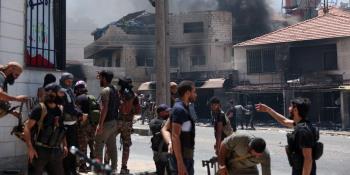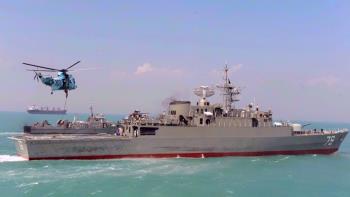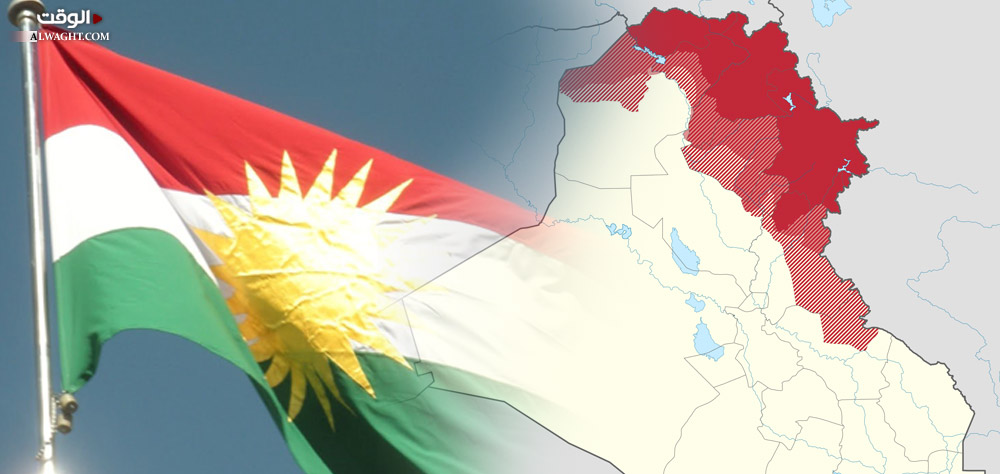Alwaght- In the years that followed rise of ISIS terrorist group in Iraq and Syria, the Western military support for the Iraq’s Kurdistan region saw a growth. After the US President Donald Trump assumed the office early this year, the cooperation witnessed a new record. During this time, and particularly in the past few months, more and more Western military and political officials made visits to the autonomous Kurdish region. A large part of the negotiations between the Kurdish officials and the Western officials revolved around working out a mechanism to strengthen the military cooperation with Erbil to battle the ISIS terrorists.
In July 12, 2016, the US Department of Defense and Kurdistan's interior ministry signed a deal to ramp up the bilateral military work towards liberation of the Mosul city, the capital of Iraq’s Nineveh province that was captured by ISIS in June 2014. According to the deal, Washington agreed to provide Erbil with $415 million in aids to help the Kurdish leaders pay the salaries of the Peshmerga fighters. The help package also covered other areas for the Kurdish military units including food, ammunition, and medical equipment.
Aside from that accord with the Americans, Jabar Yawar, the secretary general of the Peshmerga ministry, recently told the media that the Pentagon will pay $200 million in aid to fund a training and arming program for two brigades of Peshmerga forces as part of the counterterrorism strategy.
On April 21, the State Department’s Defense Security Cooperation Agency said that the US will sell the Peshmerga forces $295.6 million in arms and ammunition.
According to an announcement made by the Kurdish region’s government, training of the Peshmerga forces will take place by military officers from the US, Britain, and Germany. The training program by the foreign advisors is meant to “restructure” the Peshmerga units to transform them into professional and consistent forces, the government statement added.
The question that comes down here is that why has the US increased military backing for the Kurdish forces in recent months?
Using the Kurdish forces instrumentally
The Western, and particularly Washington, military aids for the Kurdish government can be interpreted as part of the new US strategy to fight against the ISIS terrorists in Syria and Iraq with reliance on the Western-backed local military units which represent their supporters on the ground. This alliance will help Washington gain cards for the future bargaining over regional shares. The new strategy comes against military impairment of the Kurdish forces as an efficient tool serving the Western interests in Syria and Iraq. This is a very persuasive drive for Washington to regularly deliver the US military equipment to the Syrian and Iraqi Kurds. The aids for the Syrian Kurds are even more sensitive having in mind that the Kurdish units are regarded the only ground force consistent with the Americans in the war-ravaged country.
Pressing the central Iraqi government
The American officials frequently announced that the military support for the Kurdistan region's government takes place via the central government in Baghdad. Lieutenant General Stephen J. Townsend, the commander of the US-led anti-ISIS international coalition in Iraq and Syria, told a press briefing that the ongoing war against terror helped beefing up the US army relations with the Peshmerga, however, the White House had not changed its mind about ties with the Kurdish forces and insisted that arms and equipment are provided to the Kurdish region’s forces via Iraq’s central government. On April 20, the US Department of Treasury announced that the central government is the only Iraqi side qualified for US weapons purchases. The statement, further, read that the US only sells arms to the central government with consideration of this principle.
The US army advisor Michael Knights noted that the US Peshmerga units equipping plan did not include heavy wares that will enable them to fight a modern army like Iraq’s, adding that the US was seeking to build a professional force as a supplement to the Iraqi army, devoid of potentials to launch offensives alone.
Despite all of these claims, many analysts believe that the West wants to put strains on Baghdad using this tool at the end of the road as the Iraqi officials have so far shown that they have opposed the Western strategies and even interests in their involvements in the regional crises and alliances. Baghdad's defiance foiled West's plans to unite the Arab regimes and the Israeli regime under a new alliance. Moreover, Iraq membership in Iranian-led Axis of Resistance thwarted US-designed Greater Middle East project. Iraq’s policy pushed the Western sides to seek a government in Baghdad consistent with the Western-Arab camp’s pathway in the region.
To this end, Washington works on boosting capabilities of its proxies in Iraq to put pressure on the central government. Arming and training the Kurds is part of these American efforts. With their independence-seeking aims, the Kurds could be proper tool for the US objectives. To exploit such a tool, the US sees itself required to boost it to a certain extent, with mild capability to pose challenges to Iraq’s government.



























